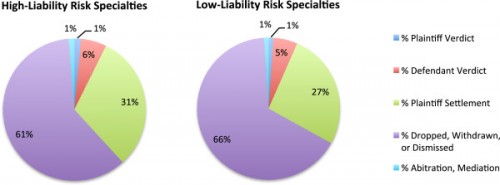I don’t know why, but I usually don’t promote my own research much here. I feel like I should highlight this one, though:
Background
“High-liability risk specialties” tend to be the focus of medical malpractice system research and debate, but concerns and fears are not limited to this group. The objective of this study was to examine whether “high-liability risk” medical specialties have a different experience with the malpractice system than “low-liability risk” specialties.
Methods
We reviewed claims data from the Physician Insurers Association of America’s Data Sharing Project between January 1985 and December 2008. We used linear regression, controlling for year, to determine how liability risk affected outcomes of interest.
Results
In high-liability risk specialties, 33% of claims result in indemnity payments compared to 28% for low-liability risk specialties (p < 0.001). The average indemnity payment for high-liability risk specialties was $315,314 compared to $267,146 for low-liability risk specialties (p = 0.25). Although only a small percentage of claims go to trial, low-liability risk specialties have significantly more claims that are ultimately dropped, withdrawn or dismissed, while high-liability risk specialties have significantly more claims that result in plaintiff settlement (p < 0.001).
Conclusions
Malpractice risk exists for all specialties. Variability in indemnity costs are found in both high- and low-liability risk specialties. Differences in the reasons for which claims are initiated for high- and low-liability risk specialties likely necessitate different risk management solutions.
There’s not that much actual data on malpractice. What little that exists focuses almost exclusively on certain “high risk” specialties. This work was an attempt to correct that, and to compare the experience of “low risk” and “high risk” specialties. Here’s figure three:
 The journal is open access, so feel free to go read the whole thing. Also, this project was supported by grant number R03HS017572 from the Agency for Healthcare Research and Quality. Thanks, AHRQ!
The journal is open access, so feel free to go read the whole thing. Also, this project was supported by grant number R03HS017572 from the Agency for Healthcare Research and Quality. Thanks, AHRQ!

